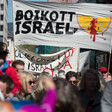Activism and BDS Beat 12 April 2016

Caterpillar equipment is used by Israel to uproot Palestinian olive trees in the occupied West Bank town of Beit Jala in August 2015.
ActiveStillsA US-based religious group may formally decide to avoid buying shares in firms deemed complicit in Israel’s abuse of Palestinian rights during the next few months.
When the Unitarian Universalist Association holds its yearly general assembly in Columbus, Ohio, this coming June, it will consider calls to support divestment from several firms with strong Israeli connections.
A resolution prepared for the gathering urges that the group should not have any shares in Caterpillar, Motorola, HP and G4S. All of those companies have been doing business in recent years with the Israeli military.
If approved, the resolution will follow initiatives already taken by the UUA in solidarity with the Palestinians.
The UUA, which has more than 1,000 congregations, owned shares in HP, Caterpillar and Motorola until recently. The association stated in March, however, that it would finish disposing of such shares by the end of that month.
Last year, the association’s committee on “socially responsible investing” introduced guidelines for screening investments to ensure that they do not contribute to abuses of Palestinian rights.
On the record
The discussion on divestment at the June assembly could, therefore, be seen as a formality. Larry Cooper, president of Unitarian Universalists for Justice in the Middle East, has nonetheless argued that a vote on divestment should go ahead.
“We still want to be on record that the UUA is not to buy shares as long as these companies are complicit in the occupation,” Cooper said, according to a Unitarian website.
The Unitarian measures come in the wake of several other divestment actions by religious groups.
Earlier this year, the United Methodist Church’s pension fund divested from two Israeli banks and barred five others from future investments. The action by the $20-billion fund was similarly guided by an ethical investment policy which identified Israel as a “high risk” country due to its lengthy record of human rights abuses.
The UMC’s 2016 general conference — scheduled to take place in Portland, Oregon, next month — will hear calls for further action. Among the proposals to be made at the event are that the church’s pension fund stops investing in Caterpillar, Motorola and HP.
In the past two years, the Presbyterian Church USA and the United Church of Christ passed divestment resolutions despite stiff and well-organized opposition by Israel lobby groups. Quaker bodies have taken a number of divestment decisions in recent years, too.





Comments
BDS works. When people of
Permalink maggie replied on
BDS works. When people of conscience refuse to participate in Israel's war crimes against the Palestinians, the equation will change. I am hoping that President Obama will abstain from the upcoming vote in the Security Council and not offer this country's protection to Israel as it always does. It's time for Israel to come face to face with the world's disapproval. If Israel doesn't mend its ways, Israel won't exist for long.
THE OLD DOG: US UPHOLDING ISRAELI IMMUNITY
Permalink Peter Loeb replied on
The US has upheld Israeli immunity for many decades.
Hopefully there will come a time when this will end. I would
not expect miracles in a US election year.
MORE IMPORTANTLY: We must all continue to support
BDS in any and all ways.
----Peter Loeb, Boston, MA, USA